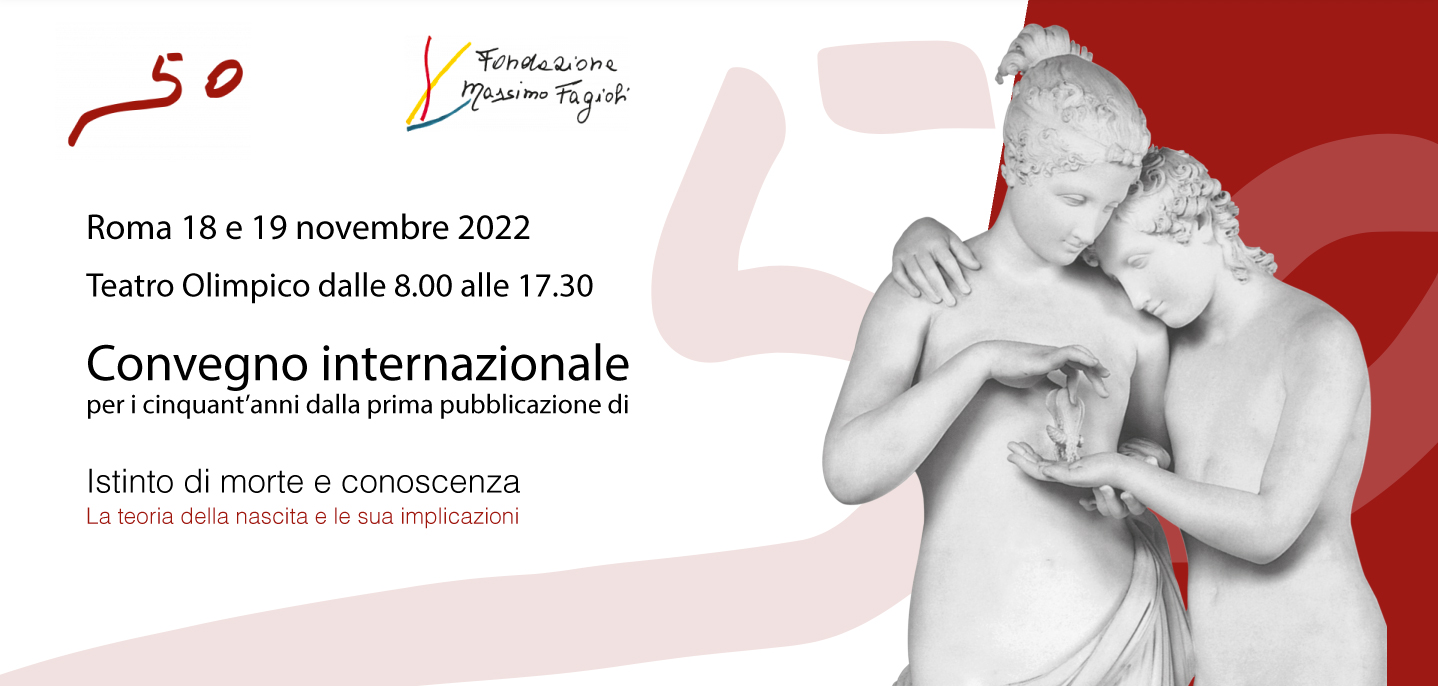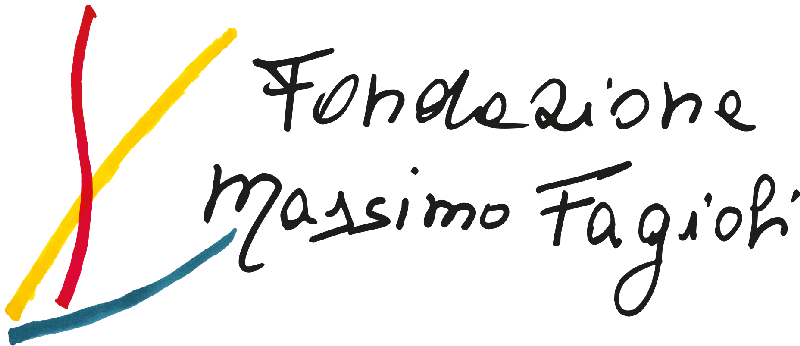18-19 November 2022, Rome International Conference for the 50th anniversary of the publication of Death Instinct and Knowledge the book that challenged Freudian psychoanalysis and laid the foundations of psychiatry as psychotherapy
A psychiatric and socio-cultural discussion with the participation of Italian and international psychiatrists, including Luigi Cancrini, Joanna E. Chambers, César A. Alfonso and Paolo Girardi, as well as artists, historians and researchers
A scientific event involving more than 200 authors, namely psychiatrists, psychotherapists, psychologists, artists, scholars and researchers in socio-cultural disciplines who have answered an international call for papers. Six in-person sessions and seven pre-recorded sessions published online, along with four invited papers, two round tables, a short film and over 40 posters.
Fifty years of Death Instinct and Knowledge – The Human Birth Theory and its Implications is the international scientific conference organized by Fondazione Massimo Fagioli held at Teatro Olimpico in Rome on 18 and 19 November 2022 to celebrate 50 years since the publication of Massimo Fagioli’s first book.
Istinto di morte e conoscenza (1972, Death Instinct and Knowledge), followed by La marionetta e il burattino (1974, The Marionette and the Puppet) and Teoria della nascita e castrazione umana (1975, Theory of Birth and Human Castration) burst onto the organic psychiatry scene of the time and challenged the psychoanalysis developed by Freud and carried forward by his followers.Now in its 14th edition and published by L’Asino d’oro edizioni, Death Instinct and Knowledge has been translated into German, English and French, while the Spanish translation is due to be published in 2023. As attested by Marcella Fagioli, psychiatrist and chair of the scientific board of Fondazione Massimo Fagioli, it is a book that articulates «the fundamental psychological dynamics for a new approach to investigating the origin and development of the human mind, particularly the non-conscious mind». She continues: «It is a critique of what is continually proposed, namely Freud’s so-called discovery of the unconscious mind. But, above all, this book underlines that the assumptions, propositions and assertions relating to the unconscious have heavily influenced culture and society and have presented an image of a human being that is fundamentally divided and in a constant struggle with an intrinsic constitutional destructiveness». Conversely, Death Instinct and Knowledge talks of «a physiological process related to the birth of the non-conscious human mind. A human mind that is originally healthy but which, as happens with the body, can become ill and fall into destructive dimensions that are not a natural condition and therefore represent», Marcella Fagioli specifies, «an illness which, as such, has to be treated».During the two-day conference, work will focus on three themes. On Friday 18 November, the discussion among Italian and international psychiatrists, psychologists and psychotherapists will be on psychiatry, neonatology and bioethics, whereas on Saturday 19th it will move on to look at the socio-cultural contexts and implications of Massimo Fagioli’s theory and practice.
According to Francesca Fagioli, psychiatrist and psychotherapist and the conference chair «the themes of the first day will be Human Birth Theory and its implications in psychotherapeutic practice and in scientific research on the development of the human mind. On the second day the debate will touch on a cultural context that ranges from art to cinema, and architecture to anthropology, areas our author addressed over the years with the imagination and the ability to create images that always distinguished him».
The conference proceedings will be opened by Alessandro Hinna, president of Fondazione Massimo Fagioli, and Marcella Fagioli. Of particular interest will be the invited papers on the two-day event. On Friday 18 November Paolo Girardi (psychiatrist, formerly full professor and director of the School of Psychiatry of Sapienza University of Rome, and former head of the Department of Psychiatry of Sant’Andrea Hospital, Rome) will talk about La criticità del paradigma biologico (The Criticality of the Biological Paradigm) and Joanna E. Chambers (psychiatrist and psychotherapist, associate professor of Clinical Psychiatry and Clinical Obstetrics and Gynecology, Indiana University School of Medicine, Indianapolis) will address The Modern Opioid Epidemic: An Example of the Intersection of Human Birth Theory and Attachment Theory. On Saturday 19 November, Luigi Cancrini (psychiatrist and psychotherapist, founder and president of Centro Studi di Terapia Familiare e Relazionale [Center for the Study of Family and Relational Therapy], Rome) will talk about I cambiamenti rivoluzionari nella psicoterapia degli ultimi 50 anni (The Revolutionary Changes in Psychotherapy over the Last 50 Years), and César A. Alfonso (psychiatrist and psychotherapist, clinical professor of Psychiatry at Columbia University, New York, and co-director of the Journal Psychodynamic Psychiatry) will give a talk entitled Architecture: Psychoanalytic Insights on the Aesthetics of Living Spaces and Social Responsibility.
There will also be a round table on each day. On Friday, the theme will be La psicoterapia dinamica alla luce della Teoria della nascita: un confronto internazionale (Dynamic Psychotherapy in the light of Human Birth Theory: An International Comparison), coordinated by Paolo Fiori Nastro (psychiatrist and didactic coordinator of the Bios Psyché school of dynamic psychotherapy) and Annelore Homberg (psychiatrist and psychotherapist, president of the European Network for Psychodynamic Psychiatry – Netforpp Europa). Also participating will be Martina Brandizzi (psychiatrist and psychotherapist), Eirini Karyotaki (associate professor of Clinical Psychology, Vrije Universiteit, Amsterdam) and Natalia Solovieva (psychologist and psychotherapist registered with BPS, BACP and Health and Care Professions Council, UK).Pensiero non razionale e identità umana (Non-rational Thinking and Human Identity) is the title of the round table to be held on Saturday 19 November, coordinated by Ugo Tonietti (professor at the Department of Architecture, University of Florence, and UNESCO consultant).
Panel members will be: Piero Bevilacqua (professor of Contemporary History), Franco D’Agostino (professor of Assyriology at the Department of Oriental Studies, Sapienza University of Rome), Paolo Fresu (musician), Annelore Homberg (psychiatrist and psychotherapist), Nicoletta Lanciano (professor in the Didactics of Sciences, Sapienza University of Rome) and Manuela Sanna (director of ISPF – Institute for the History of Philosophical and Scientific Thought in the Modern Age, the National Research Council of Italy). The day’s proceedings will end with a session chaired by Matteo Fago, editor-in-chief of L’Asino d’oro edizioni, which will include a talk by Andrea Masini, psychiatrist, psychotherapist and director of Il sogno della farfalla, on the journal’s 30-year history. Also, Paolo Fiori Nastro will talk about the Bios Psyché school of dynamic psychotherapy, and Lorenzo Vivarelli about the Amore e Psiche association as a space for cultural discussion. Carlo Anzilotti, psychiatrist and psychotherapist, and Ernesto Longobardi, professor emeritus of the University of Bari, will close the proceedings.
The Conference
The international scientific conference titled Fifty years of Death Instinct and Knowledge will be held at Teatro Olimpico, Rome (Piazza Gentile da Fabriano) on 18 and 19 November 2022. The scientific content of the conference, which is promoted by Fondazione Massimo Fagioli, is curated by 34 psychiatrists, scholars and researchers in various disciplines under the coordination of Ernesto Longobardi. The proceedings can be attended in person or online with simultaneous English translation. Details about the conference programme and access are available at: https://convegnoistinto50anni.it/en/
Accreditations for journalists and media workers: https://convegnoistinto50anni.it/en/press/
For more information: ufficio.stampa@fondazionemassimofagioli.it
Massimo Fagioli (1931-2017) was a neuropsychiatrist. After several years of research working in psychiatric hospitals in Venice, Padua and at Ludwig Binswanger’s Bellevue clinic in Kreuzlingen, he proposed that psychosis should be treated with psychotherapy. In 1972 he published Istinto di morte e conoscenza (Death Instinct and Knowledge) in which he presented the results of his training and practice. His Human Birth Theory was presented in his next two books, La marionetta e il burattino (1974, The Marionette and the Puppet) and Teoria della nascita e castrazione umana (1975, Theory of Birth and Human Castration). A few years later he published his fourth book, Bambino donna e trasformazione dell’uomo (1980, Child, Woman and the Transformation of Man). From 1975 to 2016, Fagioli conducted a unique type of group psychotherapy involving thousands of patients known as Analisi Collettiva (Collective Analysis) at the University of Rome and later in private practice. He also helped train hundreds of psychiatrists working in the public and private sectors, in Italy and internationally. In 1992, the psychiatry and psychotherapy journal Il sogno della farfalla, was founded, inspired by Fagioli’s theoretical work and practice. Also in the 1990s and 2000s, he held numerous psychiatric research meetings at the Aula Magna, Sapienza University of Rome. From 2002 to 2012, Massimo Fagioli taught Dynamic Psychology at the University of Chieti, Italy. From 2006 to his death in 2017, he wrote the Trasformazione column in Left weekly magazine. In 2018, the Italian Ministry of Education, Universities and Research approved the new school of dynamic psychotherapy, Bios Psyché, inspired by Fagioli’s theory and work. L’Asino d’oro edizioni has published 32 books by Massimo Fagioli.
For further details: https://massimofagioli.com/en/
https://www.aspi.unimib.it/collections/entity/detail/459/
Fondazione Massimo Fagioli is a non-profit organization established in 2021. It pursues civic and social aims through the safeguard, preservation and dissemination of all dimensions of Massimo Fagioli’s work, be they scientific, political, cultural or artistic, in Italy and internationally. It also aims to continue his research and his theoretical and practical training with an emphasis on practical applications, hence the diagnosis and treatment of mental disorders.
For further details: https://www.fondazionemassimofagioli.it/
Il sogno della farfalla (The Butterfly’s Dream) is a quarterly psychiatry and psychotherapy journal founded in 1992 by a group of psychiatrists drawing inspiration from Massimo Fagioli’s Human Birth Theory. Content is based on Fagioli’s theoretical framework introduced in his first book Death Instinct and Knowledge in 1972 and also refers to his practice – treatment, training, and research – in the large Analisi Collettiva group, from 1975 to 2016. The journal mainly publishes articles on psychiatry and psychotherapy and other humanistic content. The objective is to discuss different psychiatric and psychotherapeutic ideas, theories and practices, with a focus on the study of psychopathology and psychotherapy and the cure of mental disorders. Part of the catalogue of L’Asino d’oro edizioni, the journal has been indexed in the PsycINFO database since January 2007. The editorial board currently has more than 100 members, including psychiatrists and psychotherapists.
For further details: https://ilsognodellafarfalla.it/SdF
The Bios Psyché school of dynamic psychotherapy is founded on a proven psychodynamic-relational approach based on Massimo Fagioli’s theoretical and methodological work, on phenomenological psychopathology principles and research on the non-conscious mind. Its rigorous scientific framework includes psychodiagnostics, developmental psychology, dynamic psychology, and psychiatry, which together form the theoretical and clinical basis for the four-year course.
For further details: https://biospsyche.it/
Rome, 10 October 2022
Fifty years of Death Instinct and Knowledge – International Conference
Press Office
ufficio.stampa@convegnoistinto50anni.it
+39 338 679 3581
+39 329 6696626

